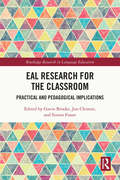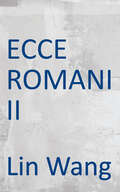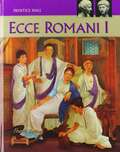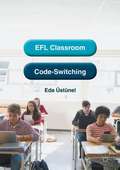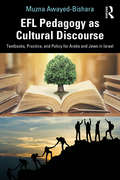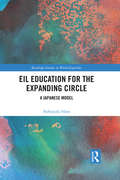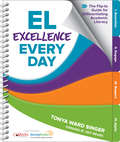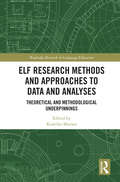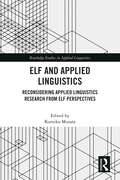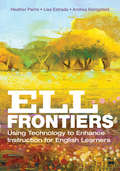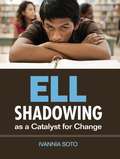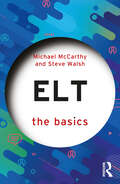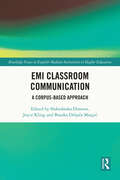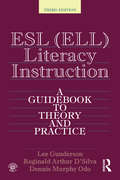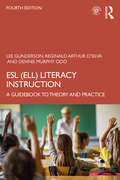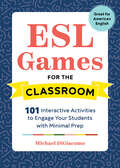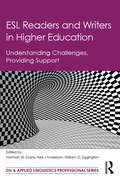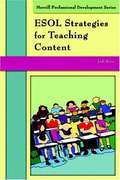- Table View
- List View
EAL Research for the Classroom: Practical and Pedagogical Implications (Routledge Research in Language Education)
by Gavin Brooks Jon Clenton Simon FraserWith an estimated 1.6 million English as an Additional Language (EAL) learners in the UK, and over 5 million in the USA, EAL research is urgently needed to inform practice. This edited volume investigates the multifaceted elements that shape EAL pedagogy and research in a variety of settings and research areas including linguistic ability influences on subject-specific skills, integrating learners’ home languages into classroom environments, and the importance of supporting EAL teachers in the classroom. In doing so, the contributors provide an international perspective on the emerging field of EAL research. The research-based chapters detail fundamental concerns related to EAL learner education. The text is composed of three parts: Part 1 explores the question of what is EAL and how a definition can shape policy construction; Part 2 examines the challenges EAL learners face in the classroom, including the use of first languages and the relative impact learner language proficiency has on subject-specific classes; and Part 3 investigates concerns relating to supporting EAL teachers in the classroom. The volume draws on researcher expertise from a variety of universities and institutions worldwide. It explores diverse language backgrounds in multilingual contexts. It covers empirical studies with pedagogical, policy and further research implications. The volume represents a single resource invaluable for EAL teachers, trainers and trainees, as well as researchers in the field of education, language learning and teaching, bilingualism and multilingualism, and second language acquisition.
ECCE Romani 2: A Latin Reading Program
by Lin Wangcontains Chapters 28 through 54 of the storyline, plus outstanding support for Word Study, Roman Life, Frontier Life, History, and Mythology
EFL Classroom Code-Switching
by Eda ÜstünelWith emphasis on teacher and learner code-switching patterns, this book is one of the first studies to comprehensively address these issues in English as a Foreign Language (EFL) classrooms. The author examines teacher and learner code-switching through quantitative analysis, discourse analysis, conversation analysis, and mixed methods used in the study of code-switching. She addresses current debates on the amount of first language (L1) use, the functions of L1 use, the functions of teacher only code-switching patterns and the functions of teacher and learners shared code-switching patterns in foreign language classrooms. The book explores the implications of EFL classroom code-switching and how this can feed into better understanding of foreign language learning and teaching, language teacher development and new research directions in TESOL and applied linguistics. The principles and discussions of EFL classrooms are easily generalised to other language classrooms. This book will be of interest to researchers in the fields of second language acquisition, applied linguistics, and ELT, as well as researchers in the fields of sociology, education, and ethnomethodology.
EFL Pedagogy as Cultural Discourse: Textbooks, Practice, and Policy for Arabs and Jews in Israel
by Muzna Awayed-BisharaThis book offers unique insight into the role that English as a Foreign Language (EFL) discourse plays in shaping the ideological terrain of contemporary Israel/Palestine through constructing the subjectivities of those who plan, teach, and learn it. While the EFL curriculum is uniform across Hebrew and Arabic-speaking educational contexts, this book traces how its cultural content reproduces dominant hegemonic ideologies, and perpetuates the social misrepresentations of the Other that underlie inequality. The language of English teaching textbooks, the way that students understand their content, and the official policy documents that guide both EFL materials and teaching practices, are all thoroughly examined through Critical Discourse Analysis. The theoretical and methodological foundation for further cross-cultural studies of Anglo-centric and other forms of hegemonic EFL discourses within local/global contexts, and for contesting their ideological effects, are also laid down. Through promoting a transformative EFL cultural discourse which hopes to position EFL teaching as a possible arena for effecting social change, this book offers a unique context for students, scholars, and educators interested in linguistics, CDA, cultural discourse studies, English in local/global contexts, and EFL education.
EIL Education for the Expanding Circle: A Japanese Model (Routledge Studies in World Englishes)
by Nobuyuki HinoThe teaching of English in the Expanding Circle, traditionally called EFL countries, has long been regarded as having no choice but to follow Inner Circle or Anglo-American norms, both in pedagogy and language models. This situation is in sharp contrast with that of the Outer Circle, or ESL countries, where the WE (World Englishes) paradigm, coupled with post-colonialism, has liberated the users of indigenous Englishes from the norms of Anglophone native speakers. Employing. Japan as a primary sample, this book proposes a new paradigm of EIL (English as an International Language) education, by integrating relevant paradigms such as WE and ELF (English as a Lingua Franca), which enables users of English from the Expanding Circle to represent their own voices in international communication.. Various examples of actual classroom practice in EIL are also presented, bridging the longstanding gap between theory and practice in this field.
EL Excellence Every Day: The Flip-to Guide for Differentiating Academic Literacy
by Tonya W. SingerTake the Flip-to Book Tour! You have to see this book to believe this book. And once you use this book it will quickly become your most treasured teaching resource. What exactly is so remarkable? All of the best teaching tools in language and literacy are at your fingertips! Just flip to that strategy you want to learn or that literacy goal you want to reach for a wealth of ready-to-use resources to actively engage learners, build academic language, and strategically support literacy instruction. Much more than a resource for EL specialists, EL Excellence Every Day is written for every teacher, with a singular focus on improving the ways we all differentiate literacy instruction. Busy teachers especially will appreciate: Over 85 flip-to strategies that help you engage and support all learners 200+ prompts and linguistic scaffolds to facilitate academic conversations connected to specific literacy goals Lesson-ready resources for essential literacy goals: anticipate before reading, read to understand, read to analyze and infer, and write with text evidence Formative assessment tasks and if/then charts for personalizing teaching to every student Differentiation guides that demonstrate how to adjust supports across EL proficiency levels Intuitive, color-coded design so you can find what you need, when you need it No one lesson or strategy is ever the perfect solution for every student. No one student learns in the same way. If there’s one universal truth in teaching it’s that every child is unique. Devour this book and soon enough you’ll provide the excellent literacy instruction each and every student deserves each and every day. "We need resources that clearly and quickly help us to meet diverse instructional needs every day in every classroom. Tonya Ward Singer’s EL Excellence Every Day: The Flip-to Guide for Differentiating Academic Literacy is such a resource." --JEFF ZWIERS, from the foreword
EL Excellence Every Day: The Flip-to Guide for Differentiating Academic Literacy
by Tonya W. SingerTake the Flip-to Book Tour! You have to see this book to believe this book. And once you use this book it will quickly become your most treasured teaching resource. What exactly is so remarkable? All of the best teaching tools in language and literacy are at your fingertips! Just flip to that strategy you want to learn or that literacy goal you want to reach for a wealth of ready-to-use resources to actively engage learners, build academic language, and strategically support literacy instruction. Much more than a resource for EL specialists, EL Excellence Every Day is written for every teacher, with a singular focus on improving the ways we all differentiate literacy instruction. Busy teachers especially will appreciate: Over 85 flip-to strategies that help you engage and support all learners 200+ prompts and linguistic scaffolds to facilitate academic conversations connected to specific literacy goals Lesson-ready resources for essential literacy goals: anticipate before reading, read to understand, read to analyze and infer, and write with text evidence Formative assessment tasks and if/then charts for personalizing teaching to every student Differentiation guides that demonstrate how to adjust supports across EL proficiency levels Intuitive, color-coded design so you can find what you need, when you need it No one lesson or strategy is ever the perfect solution for every student. No one student learns in the same way. If there’s one universal truth in teaching it’s that every child is unique. Devour this book and soon enough you’ll provide the excellent literacy instruction each and every student deserves each and every day. "We need resources that clearly and quickly help us to meet diverse instructional needs every day in every classroom. Tonya Ward Singer’s EL Excellence Every Day: The Flip-to Guide for Differentiating Academic Literacy is such a resource." --JEFF ZWIERS, from the foreword
ELF Research Methods and Approaches to Data and Analyses: Theoretical and Methodological Underpinnings (Routledge Research in Language Education)
by Kumiko MurataThis book systematically explores and discusses English as a Lingua Franca (ELF) research methods frequently deployed by ELF researchers in analysing their data. It mainly covers three different approaches: corpus-based, both written and spoken, conversation analytic and narrative approaches. In addition to exploring these different approaches to ELF data, the volume also introduces case studies that utilise them in analysing data in both academic and workplace settings, which facilitates not only the understanding of the ways in which research is conducted but also its findings. Furthermore, the book discusses theoretical underpinnings of ELF research and its recent development in its first part. It is comprehensive both in understanding theory and exploring research methods which can be deployed in conducting ELF research. The book, therefore, will be of great interest and use for both ELF researchers and educators as well as undergraduate and postgraduate students who are about to embark on their ELF and ELF-related research, and also to those who are new to the field.
ELF and Applied Linguistics: Reconsidering Applied Linguistics Research from ELF Perspectives (Routledge Studies in Applied Linguistics)
by Kumiko MurataWith help from a global cast of scholars, Kumiko Murata explores the remodelling of the discipline of applied linguistics, which traditionally regarded Anglophone native-speaker English as the standard for English as a lingua franca (ELF). This edited volume probes the dichotomy between the current focus of applied linguistic research and a drastically changed English use in a globalised world. This division is approached from diverse perspectives and with the overarching understanding of ELF as an indispensable area of applied linguistics research. The volume includes theoretical backgrounds to English as a lingua franca, the nature of ELF interactions, language policy and practice from an ELF perspective, and the relationship between multilingualism and ELF. A resourceful book not only to ELF researchers but also applied linguists in general, as well as policy makers, administrators, practicing teachers, and university students from diverse linguacultural backgrounds.
ELF and Applied Linguistics: Reconsidering Applied Linguistics Research from ELF Perspectives (Routledge Studies in Applied Linguistics)
by Kumiko MurataWith help from a global cast of scholars, Kumiko Murata explores the remodelling of the discipline of applied linguistics, which traditionally regarded Anglophone native-speaker English as the standard for English as a lingua franca (ELF).This edited volume probes the dichotomy between the current focus of applied linguistic research and a drastically changed English use in a globalised world. This division is approached from diverse perspectives and with the overarching understanding of ELF as an indispensable area of applied linguistics research. The volume includes theoretical backgrounds to English as a lingua franca, the nature of ELF interactions, language policy and practice from an ELF perspective, and the relationship between multilingualism and ELF.A resourceful book not only to ELF researchers but also applied linguists in general, as well as policy makers, administrators, practicing teachers, and university students from diverse linguacultural backgrounds.
ELL Frontiers: Using Technology to Enhance Instruction for English Learners
by Andrea M. Honigsfeld Heather Parris Lisa M. EstradaYour GPS for improving ELLs’ academic outcomes Grounded in the latest research on EL language and literacy development and technology integration, this timely book will serve as your road map for navigating the exciting new frontier of digital instruction. Learn how to improve academic outcomes, enhance language acquisition, and cultivate digital citizenship through ELL Frontiers’: An overview of current digital age learning experiences and trends Step-by-step guides to implementing technology-infused lessons that are specifically adapted for English learners, including a sample lesson seed in each chapter Authentic vignettes of current uses of technology in the classroom Professional Learning Network questions for group discussion
ELL Frontiers: Using Technology to Enhance Instruction for English Learners
by Andrea M. Honigsfeld Heather Parris Lisa M. EstradaYour GPS for improving ELLs’ academic outcomes Grounded in the latest research on EL language and literacy development and technology integration, this timely book will serve as your road map for navigating the exciting new frontier of digital instruction. Learn how to improve academic outcomes, enhance language acquisition, and cultivate digital citizenship through ELL Frontiers’: An overview of current digital age learning experiences and trends Step-by-step guides to implementing technology-infused lessons that are specifically adapted for English learners, including a sample lesson seed in each chapter Authentic vignettes of current uses of technology in the classroom Professional Learning Network questions for group discussion
ELL Shadowing as a Catalyst for Change
by Ivannia M. SotoExperience a day in the life of an ELL What if you could barely understand what your teacher was saying? ELL shadowing helps teachers experience the classroom from the student’s point of view. The author describes how to implement this easily accessible form of professional development, outlines specific strategies for adapting instruction to engage ELLs, and provides supporting videos on a companion website. Benefits include: Increased teacher sensitivity to ELLs’ school experiences A heightened sense of urgency to help ELLs learn academic language and content Improved classroom instruction that spreads throughout schools and districts More engaged students who are more likely to stay in school and reach their potential
ELT: The Basics (The Basics)
by Steve Walsh Michael McCarthyELT: The Basics offers a clear, non-jargonistic introduction to English language teaching for EFL/ESL teachers in training, early career teachers, those considering taking up ELT, and experienced teachers who may want to read about the way the profession has developed and continues to evolve. Key features of this book include: Real classroom data and data from ELT training programmes Discussion of a wide range of learning contexts and different types of learners (young learners, adults, third age, academic, refugees and immigrants, etc.) Comparisons of different types of syllabuses and methods, and discussion of current technologies An emphasis on classroom interaction as the key to maximising learning Featuring a glossary of key terms, cartoons and illustrations, further reading, personal reflection points, and discussion of the most important and relevant research, this book is a clear and accessible introduction to the complex field of ELT.
EMI Classroom Communication: A Corpus-Based Approach (Routledge Focus on English-Medium Instruction in Higher Education)
by Joyce Kling Slobodanka Dimova Branka Drljača MargićExamining English medium instruction (EMI) through a corpus-based approach, this volume offers a critical inquiry into the use of different linguistic and pedagogical strategies in the EMI classroom. It explores aspects of content lecturers’ language use, pedagogy, and intercultural communicative competence by drawing on the findings obtained from EMI lecture corpus analysis and post-observation interviews with EMI lecturers from five universities in Croatia, Denmark, Italy, the Netherlands, and Spain. The book also offers insights into lecturers’ engagement with students in English, which is their second language, as well as their perception of differences between EMI and first-language-medium instruction (L1MI). Finally, the volume provides readers with corpus-based analysis of teachers’ oral ability profiles, as a basis for the identification of communicational challenges and provision of language support. The book will be of interest to scholars interested in EMI in higher education, and postgraduate students in applied linguistics and TESOL programs. It will also be relevant to teachers who are involved in EMI provision, teacher trainers who design support programs for EMI teachers, and policymakers who establish language-in-education policies for EMI.
ESL (ELL) Literacy Instruction: A Guidebook to Theory and Practice
by Lee Gunderson Dennis Murphy Odo Reginald D'SilvaESL (ELL) Literacy Instruction provides both ESL and mainstream teachers with the background and expertise necessary to plan and implement reading programs that match the particular needs and abilities of their students. Comprehensive and research-based, it applies current ESL and reading research and theory to practice. Designed for use by pre-service and in-service teachers at all levels from kindergarten to adult learners, it explains different models of literacy instruction from systematic phonics to whole language instruction and includes specific teaching methods within each model. Multicultural issues are addressed. Instructional matrices that account for the wide variations in ESL (ELL) student backgrounds and abilities form the pedagogical basis of the approach described in the text. The matrices, based on extensive research, involve two easily measured variables that predict what programs and approaches will be comprehensible for learners who vary in age, literacy background, English ability, and program needs. Readers are encouraged to develop their own teaching strategies within their own instructional models.
ESL (ELL) Literacy Instruction: A Guidebook to Theory and Practice
by Lee Gunderson Reginald Arthur D'Silva Dennis Murphy OdoNow in its fourth edition, ESL (ELL) Literacy Instruction combines a comprehensive scope with practical, research-based tools and applications for reading instruction. Designed for use by pre-service and in-service teachers, this guidebook provides the context and expertise to plan and implement reading programs that match the needs and abilities of students at all ages and levels of proficiency. The book explains different models of literacy instruction from systematic phonics to whole language instruction, discusses controversies in the field, and includes specific teaching methods within each model. The fourth edition highlights recent developments in education policy, new models of instruction, and devotes greater attention to issues surrounding assessment. An expanded companion website integrates with the text to offer additional tools and examples, and readers are encouraged to develop their own teaching strategies within their own instructional models. Providing a thorough overview of the history and major issues of ESL (ELL) literacy instruction, this book will be of great interest to pre-service and in-service teachers at all levels, from kindergarten to adult learners.
ESL : Plus de choses à savoir sur l'anglais
by Kenneth D. BostianUn livre très utile pour les apprenants d'anglais, qu'ils soient étudiants ou enseignants. Ce livre couvre de nombreuses parties de l'anglais qui ne sont pas abordées en classe. Il comprend des contractions, des liens entre les mots, des réductions, l'utilisation de dictionnaires et bien plus encore !
ESL Games for the Classroom: 101 Interactive Activities to Engage Your Students with Minimal Prep
by Michael DiGiacomoMotivate your students to learn English with quick set-up, interactive activities from ESL Games for the Classroom. Every moment of class time counts. To fill class time productively, ESL Games for the Classroom offers effective ESL games that engage students with little or no prep work. Quick and easy to set-up, these interactive ESL activities are perfect to warm up a class, round out a lesson, or teach a particular grammar or vocabulary point. Clearly organized by skill and level, ESL Games for the Classroom is the go-to ESL teacher's companion for adding educational games to the agenda. Improve pronunciation, strengthen vocabulary, and make learning fun—ESL Games for the Classroom offers quick and easy solutions to play-based lessons with: 101 ESL games that require little or no prep work for classroom-tested fun Clear organization that allows you to quickly reference games based on the skills you're teaching, classroom size, and difficulty level Flexible use for both small and big groups, plus options for private lessons At the end of every class, leave your students excited to learn more in your next lesson with effective and entertaining activities from ESL Games for the Classroom.
ESL Più cose da sapere sull'inglese
by Kenneth D. BostianINTRODUZIONE I seguenti contenuti sono tratti da un altro libro di inglese che avevo messo insieme mentre ero in Cina. Iniziamo con le contrazioni inglesi. L'insegnamento delle contrazioni è molto importante perché le contrazioni sono una parte fondamentale dell'inglese parlato e spesso vengono ignorate dagli insegnanti di inglese stranieri. Nel resto di questo piccolo opuscolo parlo dei problemi legati alla pronuncia che spesso hanno gli studenti stranieri di inglese e di come correggere questi problemi!
ESL Readers and Writers in Higher Education: Understanding Challenges, Providing Support (ESL & Applied Linguistics Professional Series)
by Norman W. Evans Neil J Anderson William G. EggingtonESL Readers and Writers in Higher Education describes the challenges ESL students in U.S. postsecondary institutions face when studying in a second language, and offers suggestions for how teachers, advisors, tutors, and institutions might provide support that meets the reading and writing needs of this very important student population. Because the ESL profession as a whole, including what professionals are doing in the classroom, sits under the umbrella of an institutional response to a language-related challenge, some solutions aimed at helping students achieve optimal proficiency lie outside of the classroom. As such, this book is based on the assertion that language development support is not the sole responsibility of language teachers. Everyone on campuses that hosts ESL students bears some responsibility for these students' language development. Chapters are therefore, intentionally adapted to appeal to a wide variety of readers from classroom teachers, and teachers in training, to admissions officers, academic advisors, and international student advisors.
ESOL Strategies for Teaching Content
by Jodi ReissThis book is designed for teachers of math, science, and social studies in grades 3 through 12 who seek ways to reach and teach the English language learners in their classrooms. It is filled with detailed advice, sugggestions, and guidelines of a very practical and applied nature for teachers who would like to learn what they need to know and do.
